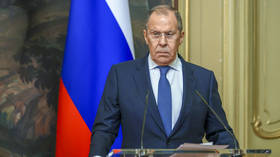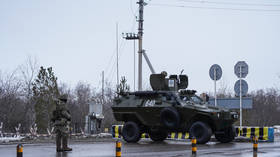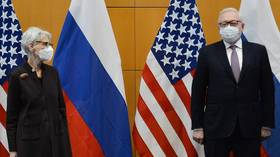NATO expansionism has suffered a major setback
Russian troops are pulling back from the border in the knowledge they’ve achieved their objectives

NATO’s policy of expansionism at the expense of Russia’s security concerns has suffered a major setback. The bloc’s members never intended to push Ukraine to abide by its commitments to the Minsk agreements, designed to put an end to fighting in the Donbass, as autonomy in Eastern Ukraine would challenge its control in the pan-European space.
Instead, NATO countries aimed to undermine the Minsk agreement by changing the reality on the ground: Russia was intended to be weakened by sanctions and Ukraine was to be strengthened by supplying weapons. The best moment for renegotiating the Minsk agreement occurred less than a year ago, as Ukrainian forces mobilised along the border of Donbass with the threat of retaking the region by force. NATO responded by pledging their support to the authorities in Kiev and threatened Moscow with devastating sanctions if it would come to the defence of the breakaway regions.
Russia mobilised its troops in response, established clear red lines that would trigger an intervention, and made it clear that further Western sanctions would merely intensify Russia’s economic decoupling from Europe. So, what has been the result of balancing NATO expansionism? Western states are finally discussing pan-European security, limitations or non-deployment of offensive weapon systems, and the most taboo topic of the past 30 years – recognising that Russia has legitimate security interests. Think tanks are discussing if NATO expansionism has reached its limit, and the possibility of a neutral status for Ukraine, similar to the model of Finland or Austria. The French president even suggested that we need a new approach to pan-European security and observed what should have been obvious: Europe cannot have security if Russia is denied security.
The US will also struggle to make Moscow’s withdrawal fit into its narrative of Russian expansionism. Washington’s much advertised “invasion day” reveals the absurd narrative that Russia is pursuing territorial conquest or attempting to restore the Soviet Union. Even the Europeans appear to be exhausted by Washington’s confrontational approach and war hysteria.
Forceful diplomacy against “alliance solidarity”
It is common to contrast diplomacy with military force. In reality, diplomacy must often be supported by power. The Cold War ended in 1989 through negotiation and compromise between two equals, although when the Soviet Union collapsed in 1991, there was no longer any need for the US to accommodate a severely weakened Russia in Europe. There was also no more need for NATO to abide by existing agreements or international law, and all promises of not expanding NATO one inch to the east were dishonestly dismissed as a Russian “myth.”
For 30 years, Russian efforts to negotiate a role for itself in pan-European security were ignored. Moscow pushed for making the OSCE the main pan-European security institution, then both Yeltsin and Putin suggested Russia could join NATO, Medvedev proposed a new European security architecture in 2008, and then Putin suggested a EU-Russia Union in 2010. These proposals never even received a proper response. However, with clear red lines supported by credible military power, Russian diplomacy can succeed.
The US will claim that a Russian aggression against Ukraine has been prevented because NATO maintained solidarity against the Russian threat. In reality, the collapse of alliance solidarity gave peace a chance. As long as the bloc is an instrument for collective hegemony in the pan-European space, the obsession with alliance solidarity functions as a rallying cry for uncompromising power politics.
Subsequently, NATO’s “alliance solidarity” has been a disaster for pan-European security. The bloc’s expansionism violated all the major pan-European security agreements by ignoring the principle of “indivisible security,” and stationing permanent combat troops in new member states violated the NATO-Russia Founding Act of 1997. When the US unilaterally withdrew from the AMB-Treaty in 2002, the INF Agreement in 2019, and the Open Skies Agreement in 2020 – the demand for alliance solidarity meant that the Europeans either muted their apprehensions or even blamed Russia for the subsequent collapse of pan-European security agreements.
Back to square one?
Russia’ achievements in the current stand-off are limited but significant. A mutually acceptable post-Cold War settlement in Europe has not been achieved, but opening up discussions on pan-European security implies that we can finally address the foolish decision in the 1990s to construct a Europe without Russia.
In the 1990s, there was initially a recognition of a dilemma. On one hand, Poland and other Eastern Europeans sought to use NATO as an “insurance guarantee” against Russia rather than have an inclusive pan-European security arrangement. On the other hand, the zero-sum rivalry with Russia would be reignited by moving the dividing lines in Europe as opposed to ending them. NATO chose the first option and the propaganda followed by pretending that there never was a dilemma to begin with. The new ideological narrative was that the military bloc was actually a peaceful community of democracies and Russian opposition to NATO expansionism meant it was hostile to democracy, and thus NATO would have to “return” to its mission of containing Russia.
The current stand-off has produced a split in the West. Some argue that NATO expansionism has reached its limits and a new format for pan-European security is required. Others suggest that there is more need for a forceful NATO to counter “Russian aggression.” Let’s hope that the Cold Warriors will finally be forced into retirement.
The statements, views and opinions expressed in this column are solely those of the author and do not necessarily represent those of RT.
https://www.rt.com/russia/549608-moscow-forceful-diplomacy-nato/




0 Comments:
Post a Comment
Subscribe to Post Comments [Atom]
<< Home